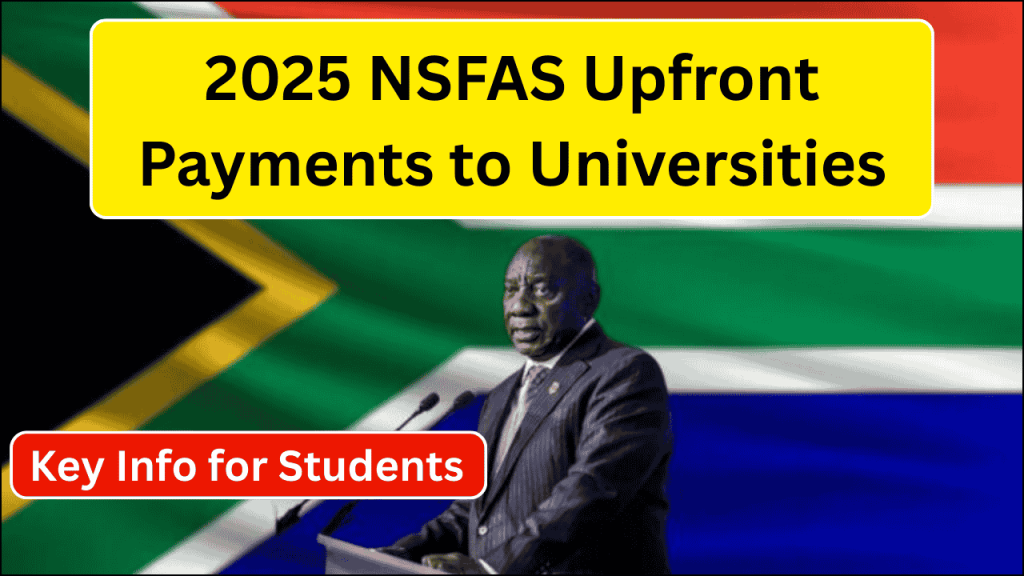
The National Student Financial Aid Scheme (NSFAS) has released upfront payments to higher education institutions across South Africa ahead of the May 2025 academic intake. This proactive funding approach aims to eliminate financial barriers for students and ensure smooth registration processes at universities and TVET colleges nationwide. The strategic early disbursement, which took place on January 10, 2025, reflects the government’s ongoing commitment to making higher education accessible to all qualified South Africans.
Understanding the 2025 NSFAS Upfront Payment System
Upfront payments represent an essential component of South Africa’s higher education funding strategy. By transferring funds to institutions before the academic year begins, NSFAS enables universities and colleges to process student registrations without financial delays, ensuring that academic calendars remain uninterrupted and students can focus on their studies from day one.
According to the Department of Higher Education and Training (DHET), these early disbursements are designed to address historical challenges where delayed funding led to registration backlogs, student protests, and academic disruptions.
Breakdown of 2025 NSFAS Upfront Payment Allocations
The 2025 upfront payments follow a structured allocation model that prioritizes different aspects of student financial needs:
| Category | Allocation Details | Purpose |
|---|---|---|
| Student Allowances | One month’s allowance per qualifying student | Covers immediate living expenses including food, transport, and personal necessities |
| Book Allowance | 50% of annual book allocation (R5,000) | Ensures students can purchase required textbooks and materials at the start of term |
| Tuition Advance | 30% of expected annual tuition fees | Allows institutions to process registrations without requiring student payments |
| Accommodation | First semester allocation for university residences | Secures student housing for the academic term |
| Administrative Support | 5% of total institutional allocation | Helps universities manage the distribution process efficiently |
This comprehensive approach ensures that all critical student needs are addressed from the outset. The NSFAS website provides detailed breakdowns of allowance amounts by institution type and study program.
Total NSFAS Budget Allocation for 2025
For the 2025 academic year, NSFAS has received a significant budget allocation to support eligible students:
| Funding Category | Amount (ZAR) | Percentage of Total Budget |
|---|---|---|
| Public Universities | R39 billion | 68% |
| TVET Colleges | R15.6 billion | 27% |
| Administrative Costs | R2.3 billion | 4% |
| Reserve Fund | R0.6 billion | 1% |
| Total NSFAS Budget | R57.5 billion | 100% |
This represents a 12% increase from the 2024 allocation, reflecting the government’s growing investment in higher education accessibility. According to the National Treasury, this funding will support approximately 1.2 million students across all public higher education institutions.
Application Status Overview for 2025 Academic Year
As of April 2025, NSFAS has processed the majority of applications for the upcoming academic year:
| Application Category | Applications Received | Processed/Approved | Percentage |
|---|---|---|---|
| SASSA Beneficiaries | 658,943 | 606,113 | 92% |
| Non-SASSA Applicants | 276,072 | 201,848 | 73% |
| Student Loan Requests | 17,370 | 9,546 | 55% |
| Appeals | 24,605 | 18,453 | 75% |
| Total Applications | 976,990 | 835,960 | 86% |
Students can check their application status through the NSFAS Student Portal and should ensure all required documentation is submitted promptly to avoid processing delays.
The Higher Education Capacity Challenge
Despite the substantial financial support from NSFAS, South Africa’s higher education system continues to face significant capacity challenges:
| Year | Bachelor-Pass Matric Students | Available University Places | Shortfall | Percentage Accommodated |
|---|---|---|---|---|
| 2023 | 324,226 | 200,000 | 124,226 | 62% |
| 2024 | 337,158 | 202,000 | 135,158 | 60% |
| 2025 (Projected) | 345,000 | 205,000 | 140,000 | 59% |
This growing gap between qualified applicants and available university places underscores the importance of exploring alternative higher education pathways. The Central Application Service (CAS) provides centralized application processing and placement services to help students identify available opportunities.
TVET Colleges: A Strategic Alternative
In response to university capacity constraints, the Department of Higher Education and Training is actively promoting Technical and Vocational Education and Training (TVET) colleges as valuable alternatives:
| Aspect | TVET College Advantage |
|---|---|
| Industry Relevance | Programs designed with input from industry partners |
| Duration | Shorter, focused programs (6 months to 3 years) |
| Cost | Lower tuition fees compared to universities |
| Practical Skills | Emphasis on hands-on, workplace-ready training |
| Employment Prospects | Direct pathways to in-demand technical careers |
| NSFAS Support | Full funding available for qualifying students |
According to the DHET TVET Branch, these institutions offer excellent opportunities for students seeking career-focused education with strong employment prospects. NSFAS funding for TVET students covers tuition, accommodation, transport, and personal allowances, making these institutions financially accessible.
Improvements to the NSFAS System for 2025
NSFAS has implemented several system improvements for the 2025 academic year:
- Enhanced Digital Application Platform: The upgraded online system allows for faster processing and real-time status updates. Visit the NSFAS Applications Portal to apply.
- Direct Payment System: NSFAS has expanded its direct payment system to more institutions, allowing students to receive allowances directly rather than through university disbursement.
- Appeals Process Streamlining: A new dedicated appeals platform has been established to expedite the review of rejected applications. Students can access this through the NSFAS Appeals Portal.
- Mobile Application: The new NSFAS mobile app allows students to check status, submit documents, and report issues from their smartphones.
These enhancements aim to address previous administrative challenges and improve the overall student experience with financial aid services.
Student Accommodation and Transportation Initiatives
Recognizing that academic success depends on adequate living conditions and reliable transportation, the Department of Higher Education has established dedicated initiatives to address these challenges:
| Initiative | Description | Status as of May 2025 |
|---|---|---|
| Student Housing Infrastructure Programme (SHIP) | Public-private partnerships to build 300,000 new bed spaces | 120,000 completed, 80,000 under construction |
| Safe Travel for Students | Subsidized transport services in major university cities | Operational in 7 metropolitan areas |
| Private Accommodation Accreditation | Standards and monitoring system for private student housing | Implemented at 16 universities |
| District Housing Portal | Centralized platform for verified off-campus accommodation | Live in 4 provinces, expanding nationwide |
These programs are coordinated through the University Infrastructure Development Programme, which oversees infrastructure development across South Africa’s higher education landscape.
Key Dates for NSFAS Recipients (2025 Academic Year)
| Event | Date | Action Required |
|---|---|---|
| Upfront Payments to Institutions | January 10, 2025 | None – institutional process |
| Registration Period | April 15 – May 10, 2025 | Students must register at their institutions |
| First Direct Allowance Payment | May 15, 2025 | Ensure banking details are updated on NSFAS portal |
| Confirmation of Attendance | May 25, 2025 | Submit through NSFAS portal or institutional system |
| Second Allowance Payment | June 15, 2025 | None – automatic if attendance confirmed |
| Mid-Year Reassessment | July 20-30, 2025 | Submit academic progress reports if requested |
Students should regularly check both their institutional student portals and the NSFAS Student Portal for institution-specific schedules and requirements.
What Students Should Do Now
If you are an NSFAS-funded student or applicant, take these immediate steps:
- Verify your application status on the NSFAS Student Portal
- Ensure all documentation is submitted, including:
- Identity documents
- Proof of income
- Academic records
- Bank account details
- Contact your institution’s financial aid office to confirm registration procedures
- Update your contact information to receive important notifications
- Explore accommodation options through your institution’s housing department
For assistance with any NSFAS-related queries, contact the NSFAS Call Centre at 08000 67327 or visit the NSFAS Contact Page.
Conclusion
The 2025 NSFAS upfront payment initiative represents a significant step toward ensuring accessible higher education in South Africa. By addressing financial barriers at the outset of the academic year, these payments help create a more stable and supportive environment for students to pursue their educational goals.
While challenges remain in terms of system capacity and infrastructure, the combined efforts of NSFAS, higher education institutions, and government departments demonstrate a strong commitment to expanding educational opportunities for South African youth. Students are encouraged to stay informed about their funding status, explore all available educational pathways, and take full advantage of the support systems in place.
For the most current information about NSFAS funding and policies, visit the official NSFAS website or the Department of Higher Education and Training.
Frequently Asked Questions
When will I receive my first NSFAS allowance payment for the 2025 academic year? Direct allowance payments to students begin on May 15, 2025, provided you have completed registration and confirmed your banking details.
Will NSFAS fund me if I choose to study at a TVET college instead of a university? Yes, NSFAS provides comprehensive funding for qualifying students at all public TVET colleges.
What should I do if my NSFAS application status is still showing as “pending” in May 2025? Contact the NSFAS Call Centre at 08000 67327 immediately and ensure all requested documentation has been submitted through the student portal.

Isabell Johnson is a passionate writer known for captivating stories that blend imagination and reality. Inspired by travel, history, and everyday moments, She crafts narratives that resonate deeply with readers.




